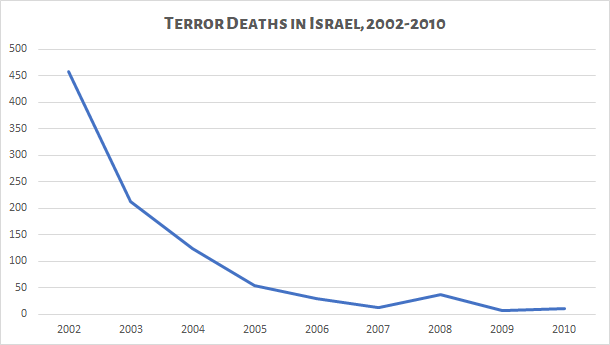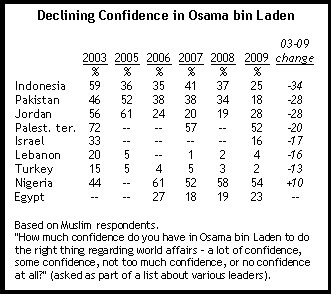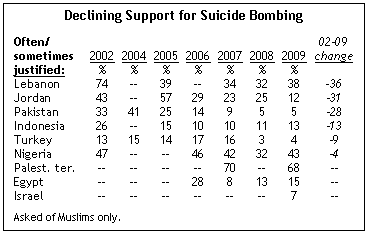Tuesday, April 11, 2023
 Tuesday, April 11, 2023
Tuesday, April 11, 2023 Elder of Ziyon
Elder of Ziyon car ramming, glorifying terror, Islamic Jihad, Palestinian propaganda, PIJ, Poster, seeking martyrdom, stabbing, suicide bombing, supporting terror
car ramming, glorifying terror, Islamic Jihad, Palestinian propaganda, PIJ, Poster, seeking martyrdom, stabbing, suicide bombing, supporting terror
Thursday, January 12, 2023
 Thursday, January 12, 2023
Thursday, January 12, 2023 Elder of Ziyon
Elder of Ziyon 2002 Terror, 2003 Terror, 2004 Terror, 2005 Terror, 2006 Terror, 2007 Terror, 2008 Terror, 2009 Terror, 2010 Terror, Islamic Jihad, PIJ, Ramadan Shalah, security fence, separation barrier, suicide bombing, UN
2002 Terror, 2003 Terror, 2004 Terror, 2005 Terror, 2006 Terror, 2007 Terror, 2008 Terror, 2009 Terror, 2010 Terror, Islamic Jihad, PIJ, Ramadan Shalah, security fence, separation barrier, suicide bombing, UN
Islamic Jihad leader Ramadan Shalah publicly admitted that Israel’s security fence is a significant obstacle to the Palestinian terrorist organizations. “If it weren’t there," he told Al-Manar Television, "the situation would be entirely different.”On November 11, 2006, Shalah granted a long interview to Al-Manar TV, Hizbullah’s television channel. He asserted that suicide bombing attacks are the Palestinian people’s “strategic choice” and the terrorist organizations have every intention of continuing suicide bombing attacks, but that their timing and the possibility of perpetrating them from the West Bank depends on other factors.“For example,” he said, “there is the separation fence, which is an obstacle to the resistance, and if it were not there the situation would be entirely different.”
Sunday, September 11, 2022
 Sunday, September 11, 2022
Sunday, September 11, 2022 Elder of Ziyon
Elder of Ziyon 9/11, defending terrorism, glorifying terror, osama bin laden, Palestinian Authority, Palestinian propaganda, Pew survey, poll, suicide bombing, Terrorism
9/11, defending terrorism, glorifying terror, osama bin laden, Palestinian Authority, Palestinian propaganda, Pew survey, poll, suicide bombing, Terrorism
Wednesday, August 24, 2022
 Wednesday, August 24, 2022
Wednesday, August 24, 2022 Varda Meyers Epstein (Judean Rose)
Varda Meyers Epstein (Judean Rose) glorifying terror, Hezbollah, Islamic values, Judean Rose, martyrdom, Opinion, palestine media watch, palwatch, PMW, Richard Landes, self-death palestinians, suicide bombing, Varda
glorifying terror, Hezbollah, Islamic values, Judean Rose, martyrdom, Opinion, palestine media watch, palwatch, PMW, Richard Landes, self-death palestinians, suicide bombing, Varda
Life is a supreme Jewish value. So much so that it’s customary to make charitable donations or monetary gifts in multiples of 18: the numerical value of the Hebrew word for life: chai. When we drink in celebration we say, “L’Chaim,” as popularized by the song from Fiddler on the Roof.
We Jews place life on a pedestal not only in times of celebration
but in times of mourning too. Anglo-Jews from Britain and communities in the
former Commonwealth, for example, are likely to conclude a condolence call with
“I wish you long life.”
In Islam, on the other hand, life appears to take a
backseat to death. The goriest murders, butchery, death, and suicide seem not to
faze Muslims at all. Whereas Jews are preoccupied with life, the Muslim thinks
more about death. In a 2004 op-ed, Aspiration
not Desperation, Itamar Marcus and Barbara Crook detailed the final words
of a suicide bomber, describing her joy at the prospect of blowing herself to
smithereens.
“I always wanted to be the first woman who sacrifices her life for Allah. My joy will be complete when my body parts fly in all directions.”
These are the words of female suicide terrorist Reem Reyashi, videotaped just before she killed four Israelis and herself two weeks ago in Gaza. What is surprising about this horrific statement is that she put a positive value on her dismemberment and death, distinct from her goal to kill others. She was driven by her aspiration to achieve what the Palestinians call “shahada,” death for Allah. She had two distinct goals: To kill and to be killed. These independent objectives, both positive in her mind, were goals greater than her obligations and emotional ties to her two children. This aspiration to die, which contradicts the basic human instinct for survival, is at the core of the suicide terrorism fervor.
Contrast this with the Jewish concept of dying “al Kidush Hashem,” in sanctification of
God’s name. Every Holocaust victim, every Jewish terror victim, is considered
to be a holy martyr. But Jews don’t strive for that holy eventuality—we don’t court
death for the sake of martyrdom. Which is what all too many Muslims seem to do.
Most people can't stand the sight of blood, but blood doesn't seem to generate the same revulsion in Muslims. Take the Muslim holiday of Eid al-Adha, which commemorates
what we Jews still call the Akedat
Yitzchak, the binding of Isaac. The Muslim version, which of course
postdates Jewish scripture substitutes “Ibrahim” for Abraham, and “Ismail” for
Isaac. Jews remember the Akedah by reciting
the story from the Torah before the congregation on the second day of Rosh Hashanah.
Muslims, on the other hand, celebrate their version of the story with mass
slaughter of livestock. So many animals are killed on this holiday, that in
2016, the streets of Dhaka, Bangladesh ran red with blood.
 |
| Dhaka, 2016 |
In The
value of life in the Jewish tradition: Towards understanding Jewish bioethics,
written in 2009, Professor Michael Barilan of the Sackler School of Medicine at
Tel Aviv University, writes about protecting the ability of animals to
procreate and bring new life and what we as humans are supposed to learn from
this:
Judaism is possibly the only religion that prohibits all forms of castration. This taboo creates grave challenges to pet owners, modern animal farming and scientific research. However, when one becomes aware of the ubiquity of sterilization in the utilization of animals, one may also appreciate the subtle protest Judaism articulates against the mechanical exploitation of animals. The prohibition on sterilization of animals and humans underscores further the special regard in Judaism to the capacity to generate life. According to Sefer Ha’hinnukh, castration articulates a nihilistic attitude towards life. Contemporary scholarship on Judaism and human rights also interpret God’s admonition “Choose life!” as a call for hope and engagement in worldly life, not as a strict refusal to recognize situations in which loss of life is the more dignified and just course of action.
In regard to shedding blood, Barilan writes,
Ironically, the first prohibition on bloodshed is articulated in terms of the death penalty. “Whoso sheds man’s blood, by man shall his blood be shed, for in the Image of God made he man.”
The Torah does not tell us directly, “do not kill” the way God proscribed eating from the tree of knowledge. From the story on Cain and Abel we learn that this knowledge is self-evident; every person must recognize it naturally.
Many Muslims, apparently do not. There is ample evidence of the
Muslim thirst for bloodshed.
As Itamar Marcus and Barbara Crook documented in their
aforementioned op-ed, “Palestinian society actively promotes the religious
belief that their deity craves their deaths. Note the words of a popular music
video directed at children, broadcast hundreds of times on PA TV, which depicts
the earth thirsting for the blood of children: ‘How sweet is the fragrance of
the shahids, how sweet is the scent of the earth, its thirst quenched by the
gush of blood, flowing from the youthful body.’”
Life is so important to Jews that we are allowed to break
just about any religious commandment in order to save the life of a human
being. Look at that last sentence carefully. There is rabbinical
consensus that we are commanded to breach Torah laws not only in order to
save Jewish lives, but in order to
save the life of any human being in
peril.
In Jewish law, human life comes first. We understand how
important a man’s life is—any man’s life—by the early mention of the concept in
Scripture:
“And God created man in His image, in the image of God He
created him.” (Genesis 1:27)
Judaism is life-affirming. Islam, on the other hand, cares
little for life, and instead embraces death with a whole heart. More from
Marcus and Crook:
PA ideology rejects the value of ‘life’ that other societies hold supreme. As expressed by a senior historian, Professor Issam Sissalem, in a lecture on PA TV: “We are not afraid to die, and do not love life.”
This attitude was echoed by Nidal Malik Hasan in wrapping up
a presentation he created for his fellow doctors, two years before he killed
thirteen and wounded 29 at Fort Hood: “We love death more than you love life!”
According to the National
Post, the sentence originates with “a 7th-century Muslim commander who
threatened his enemies with the prospect of ‘an army of men that love death as
you love life.’”
The Post then
references a 2004 interview with Hezbollah head Hassan Nasrallah. Professor
Richard Landes quotes the same interview in Lessons
from Kafr Qana:
“We have discovered how to hit the Jews where they are the
most vulnerable. The Jews love life, so that is what we shall take away from
them. We are going to win, because they love life and we love death.”
Landes, describing Muslim awareness of their own obsession
with death, writes:
Even as they deplore it, Arab intellectuals acknowledge the depths of the problem: Wrote Tunisian intellectual Al-Afif Al-Akhdar:
“Why do expressions of tolerance, moderation, rationalism, compromise, and negotiation horrify us [Muslims], but [when we hear] fervent cries for vengeance, we all dance the war dance?… Why do other people love life, while we love death and violence, slaughter and suicide, and [even] call it heroism and martyrdom?”
In Death: a
beautiful Gift for a believer (compiled by unknown), the author describes
hating death as the provenance only of the “ignorant”:
Hatred towards death and love of the world is the outcome of an ignorant person's mind, who thinks that the happiness of this world is his prosperity and good fortune. The world beset with numerous troubles and anxieties is about to end in misery and does not enjoy eternity, perpetuity and sincerity. A poet has referred to this in the following words - “Do not give your heart to this world, for its example is of an unfaithful bride who has never loved you, even for a night.”
Unknown also writes:
[Hazrat Qasim], the son of [Imam Hasan Al-Mujtaba], when asked concerning death at Karbala, answered: “death to me is sweeter than honey.”
He continues (emphasis added):
Usually, most of the people are alarmed and fearful upon hearing the word `death', and to them, death appears dreadful and terrifying, whereas, according to the Islamic ideology, this terminology or this subject has a different appearance and can be perceived in a different way. Basically it can be said that those who fear death, consider it to be a negative entity.
According to this insight, death is an end of life and a moment of everlasting separation of man with his life. They believe that with death, the compounded substances of the body suffer a breakdown and return to nature and man too, is nothing except this very broken-down body. Hence, with death, everything ends with no hope remaining!
Indeed, with this view and insight, death is darker and more dreadful than every other thing and perhaps, no calamity, pain, sorrow and tragedy can be greater and more painful than the tragedy of death, because death would mean the burial of all the desires, hopes, longings and in short, the termination of all things for man - that man who loved life and eternity very dearly.
Anyway, Islam does not possess such a dark and fear-instilling view of death because according to the Islamic view, death is a positive entity.
But it is more than that, of course. It’s more than our differing views on life and death, but the gruesomeness of the Muslim culture of death, the horrifying bloodlust that accompanies those beliefs; the nature of the killings; and the lack of even the tiniest drop of the milk of human compassion when choosing their victims.
Tuesday, July 26, 2022
 Tuesday, July 26, 2022
Tuesday, July 26, 2022 Elder of Ziyon
Elder of Ziyon 2001, apartheid lies, double standards, durban conference, intifada, second intifada, suicide bombing
2001, apartheid lies, double standards, durban conference, intifada, second intifada, suicide bombing
Thursday, July 29, 2021
 Thursday, July 29, 2021
Thursday, July 29, 2021 Elder of Ziyon
Elder of Ziyon 2001 Terror, Ahlam Tamimi, hamas, Jerusalem, Jordan, King Abdullah, Malki Roth, martyrdom, Sbarro Pizza, suicide bombing, terror attack, Terrorism
2001 Terror, Ahlam Tamimi, hamas, Jerusalem, Jordan, King Abdullah, Malki Roth, martyrdom, Sbarro Pizza, suicide bombing, terror attack, Terrorism
It caused an unprecedented state of terror and chaos among the Jews.-....The operation is commensurate with the ability of the battalions to plan, develop and reach the depth of the enemy and in the most secure places, which astonished the enemy and made loved ones and family rejoice (and heal the hearts of a believing people)....The mujahadeen chose the prime time for lunch at the restaurant.
Afterwards, when I took the bus, the Palestinians around Damascus Gate [in Jerusalem] were all smiling. You could sense that everybody was happy. When I got on the bus, nobody knew that it was me who had led [the suicide bomber to the target]... I was feeling quite strange, because I had left [the bomber] 'Izz Al-Din behind, but inside the bus, they were all congratulating one another. They didn't even know one another, yet they were exchanging greetings...While I was sitting on the bus, the driver turned on the radio. But first, let me tell you about the gradual rise in the number of casualties. While I was on the bus and everybody was congratulating one another....I admit that I was a bit disappointed, because I had hoped for a larger toll. Yet when they said "three dead," I said: 'Allah be praised'...Two minutes later, they said on the radio that the number had increased to five. I wanted to hide my smile, but I just couldn't. Allah be praised, it was great. As the number of dead kept increasing, the passengers were applauding.
We saw Palestinians celebrate murdered Jews only this past May. This isn't a one time thing - consistently, a vast majority of Palestinians have shown support for specific terror attacks after the fact, including, infamously, the 9/11 attacks that occurred only a month after Sbarro.
Here is a celebration after the 2014 attack at the Har Nof synagogue, killing four rabbis.
Sunday, March 14, 2021
 Sunday, March 14, 2021
Sunday, March 14, 2021 Elder of Ziyon
Elder of Ziyon Ahlam Tamimi, hamas, Interpol, Islamic Jihad, Israel, Izz al-Din Shuheil al-Masri, Jerusalem, Mustafa Nasrallah, PIJ, Sbarro Pizza, suicide bombing, terrorist attack
Ahlam Tamimi, hamas, Interpol, Islamic Jihad, Israel, Izz al-Din Shuheil al-Masri, Jerusalem, Mustafa Nasrallah, PIJ, Sbarro Pizza, suicide bombing, terrorist attack
Thursday, August 17, 2017
 Thursday, August 17, 2017
Thursday, August 17, 2017 Elder of Ziyon
Elder of Ziyon Al Qassam Brigades, clan clashes, Egypt, Fatah, Goldstone Report, hamas, irony, Islamic Jihad, Nidal al-Jaafari, pchr, PFLP, PIJ, Rafah, suicide bombing, terror victims
Al Qassam Brigades, clan clashes, Egypt, Fatah, Goldstone Report, hamas, irony, Islamic Jihad, Nidal al-Jaafari, pchr, PFLP, PIJ, Rafah, suicide bombing, terror victims
Times of Israel reports:
A suicide bomber killed a Hamas guard in southern Gaza early Thursday when forces tried to stop him from infiltrating into Egypt, members of the terror organization said, in what sources described as a rare attack against the Islamist group.Here is the late Mr. Jaafari.
“Early this morning security forces stopped two people approaching the southern border (with Egypt),” an interior ministry spokesman in the Hamas-run territory said in a statement.
“One of them blew himself up,” it added.
Later a medical source confirmed a member of Hamas had died in the attack.
The source named the man as Nidal al-Jaafari, 28.
Notice that he is a member of the Al Qassam Brigades, Hamas' "militant wing." But he is also a guard - which means according to the Goldstone report and the PCHR, he is a civilian.
Hamas doesn't distinguish between civilians and their "militants." Yet the world keeps pretending that there is a distinction.
Another thing to keep in mind is that the Rafah crossing is open now for the first time in four months, as Egypt is allowing Hajj pilgrims to leave. Practically no one has been reporting on the actual siege by Egypt on Gazans for four long months - months during which Israel allowed thousands to pass through its own Erez crossing.
More interesting is the reaction of other terror groups to this suicide bombing, apparently by a Salafist.
Islamic Jihad condemned the bombing in Rafah as "outside religion, culture and morality."
The Popular Front for the Liberation of Palestine stressed that it is "against the use of weapons, abuse and assault" describing the suicide attack as a "dangerous violation."
Fatah called it a "terrorist act."
The Popular Struggle Front called this a "dark act that must be combatted"
Yes, the Islamists who innovated suicide bombings as suddenly aghast at the idea of becoming the victims of Islamist suicide bombings. It's so immoral!
Monday, January 05, 2015
 Monday, January 05, 2015
Monday, January 05, 2015 Elder of Ziyon
Elder of Ziyon Egypt, Har Nof, Islamic values, justifying terror, moderate Islam, Muslim antisemitism, opinion poll, Pew survey, suicide bombing, supporting terror
Egypt, Har Nof, Islamic values, justifying terror, moderate Islam, Muslim antisemitism, opinion poll, Pew survey, suicide bombing, supporting terror
Why don’t Muslim leaders speak out?He gives examples of widespread condemnations by Muslim leaders, for example of the hostage taking in Australia and the massacre in Peshawar.
That question comes up every time terrorists purporting to be deeply religious Muslims carry out armed attacks that kill innocent people. Where, commentators ask, are the moderate Muslim leaders and why aren’t they decrying the horrors perpetuated by fellow Muslims?
In fact, mainstream Muslims are speaking out, clearly and consistently. Leaders around the world, many of whom I know personally through my work at the Foundation for Ethnic Understanding, have issued strong and unambiguous statements virtually every time a violent attack has occurred, condemning such acts as immoral and counter to the fundamental precepts of Islam.
Yet somehow their responses are not being heard, barely registering in the public consciousness.
Schneier even says that Muslim leaders are condemning European antisemitism:
For example, after riots by a predominantly Muslim crowd in the Paris suburb of Sarcelles attacked a synagogue and Jewish businesses, the local Muslim Association sent a letter of solidarity and support to the vice president of the synagogue. National Muslim leaders took part in an interfaith ceremony that denounced the violence and called for reconciliation. French Council of the Muslim Faith head Dalil Boubakeur, who attended the ceremony, affirmed that the vast majority of French Muslims are not anti-Semitic. How could they be, he asked, when they themselves are battling racism?To praise Muslim leaders for condemning a massacre of 130 children is faint praise indeed.
There is no political cost for a Muslim to denounce a massacre of children. There is no political cost for a Muslim leader outside ISIS-controlled areas to denounce ISIS. There is little downside for Western Muslim leaders to send letters of solidarity to Jewish victims of terror.
The question is how many Muslim leaders are willing to denounce Islamic-inspired terror, publicly and to their own confregations, when there is a political cost.
Some do. A wonderful example is Sheikh Samir Aasi, Imam of the main mosque in Akko (Acre), whose condemnation of the Har Nof synagogue attack resulted in one of his flock attacking his car with acid.
However, the emphasis on condemnations misses the point.
The fact is that the percentage of Muslims who support terror is not tiny. A significant number of Muslims in Muslim-majority countries think that suicide terrorism is sometimes or often justified.
In a speech on New Year’s day, Egyptian President Abdel Fattah al-Sisi called for a “religious revolution” in Islam that would displace violent jihad from the center of Muslim discourse.
“Is it possible that 1.6 billion people (Muslims worldwide) should want to kill the rest of the world’s population—that is, 7 billion people—so that they themselves may live?” he asked. “Impossible.”
Speaking to an audience of religious scholars celebrating the birth of Islam’s prophet, Mohammed, he called on the religious establishment to lead the fight for moderation in the Muslim world. “You imams (prayer leaders) are responsible before Allah. The entire world—I say it again, the entire world—is waiting for your next move because this umma (a word that can refer either to the Egyptian nation or the entire Muslim world) is being torn, it is being destroyed, it is being lost—and it is being lost by our own hands.”
He was speaking in Al-Azhar University in Cairo, widely regarded as the leading world center for Islamic learning.
“The corpus of texts and ideas that we have made sacred over the years, to the point that departing from them has become almost impossible, is antagonizing the entire world. You cannot feel it if you remain trapped within this mindset. You must step outside yourselves and reflect on it from a more enlightened perspective.”
Here's part of the speech. (h/t Effect)

 Elder of Ziyon
Elder of Ziyon









.png)






























